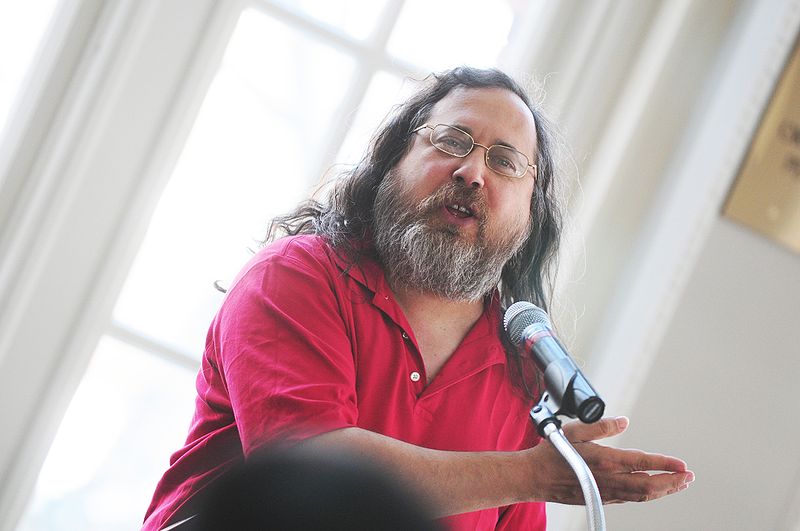Australian e-tax software unjust: Stallman

Richard Stallman, president and founder of the Free Software Foundation, has said that the Australian Taxation Office's e-tax software is "unjust".

Richard Stallman
(RMS at Pitt image by Victor Powell, CC BY-SA 3.0)
E-tax is software provided by the Australian Taxation Office to conduct tax returns online. The office has been under fire for a number of years for not making a version of the software function on Linux or Apple Mac systems.
However, this wasn't the reason Stallman called the product "unjust". His reasoning for this term was that it is not "free" software.
Stallman feels strongly about freedom and wanted to be very clear on the distinction between free software and open source.
According to Stallman, free software allows the users to do four key things:
- run the program as they wish
- study the source code and change it to make the program do computing as desired
- redistribute the original program to other users
- redistribute a modified program to other users.
"The users have control of the software and that's what enables computer users to have freedom, to live in freedom," he said.
According to the Australian Taxation Office, the source code for e-tax is not available for alteration, contravening the second tenet of free software.
"This is obviously unjust practice by the government," Stallman said. "The government must never distribute non-free software to citizens or suggest that they use any non-free software."
He said that Brazil had a similar problem. However, Alexandre Oliva, board member of the Latin American Free Software Foundation, has provided a free software alternative.
"He releases a free program to do the same job and you can use that. This year he actually released his updated program before the official one came out. After all, it's based on the tax code."
It would be good for Australians to do the same thing, Stallman believed.
"There's no reason at all why the program shouldn't be free software," he said. "After all, the place where you have to check for inconsistent data is in the server. It would be utterly stupid to depend on a program running in the user's computer to check the consistency of the user's tax report.
"Once they do the obviously necessary thing, which is to check the consistency of the data in the server, there's no need to check or limit anything in the user's machine."
The Australian Taxation Office declined to comment on Stallman's premise.
People needed to protect their freedoms more vigorously, according to Stallman.
"Australians are not paying enough attention," he said.
"On a previous visit to Australia I visited the National Library and I saw a copy of the Magna Carta enshrined there, so that people could pay no attention to the principles therein in their daily lives," he said. "People should protest a whole series of unjust laws that have been established in Australia, taking away basic freedoms in the name of security."
Stallman pointed out that censorship was already alive and kicking in Australia after an incident where Electronics Frontiers Australia was faced with an $11,000 fine if it didn't remove a link on its website that took people to a political site.
The government's proposed internet filter would institute additional censorship, Stallman said.
Free software versus open source
Free software came before open source, Stallman said, with the Free Software Movement (FSM) starting in 1983. However, not all the users of the free operating system GNU, which the movement had launched, agreed with the goals of the FSM.
A group of users splintered and started campaigning under the name of open source in 1998. A lot of open-source software is free and a lot of free software is open-source software, according to Stallman. The definition, although derived from the free software definition, is much longer and looser, Stallman said, allowing software to be classified as open source, which would not be considered as free.
For example, Android, considered an open-source platform, would not be free software as such if run on the Motorola Droid X, because although users might access Android source code and be able to alter it, an altered version would not be able to be run on the phone, Stallman said.
"If you get the source code, you can edit the source code, you can compile your version of the source code, but you can't effectively run your source code," he said. "And this is an increasing problem, the problem of tivoisation, which is building products so that they recognise if the user has installed a changed version of the software and refuse to let it run at all."
He said he called it tivoisation because that was the name of the "malicious product" that had pioneered the way of making free programs non-free.
Richard Stallman is currently in Australia to attend the World Computer Congress next week, where he'll hold a keynote on Tuesday, 21 September. He'll also be speaking in Melbourne at a National ICT Australia Event tonight and a Royal Melbourne Institute of Technology event tomorrow. He encouraged those who wanted more information on free software to visit GNU.org for more information or to join the Free Software Foundation.